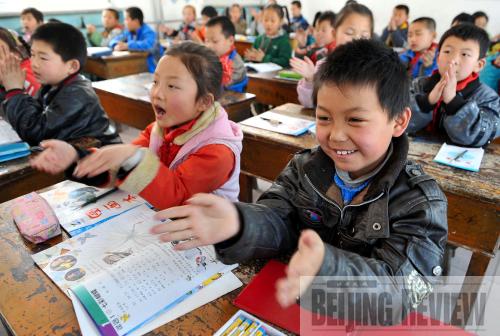|
 |
|
TUNE OF HAPPINESS: Students in a rural Ningxia Hui Autonomous Region primary school during music class on February 23. Rural students receiving nine-year compulsory schooling in Ningxia have enjoyed government living subsidies since 2006 (WANG PANG) |
The National Human Rights Action Plan of China (2009-2010), issued by the Information Office of the State Council on April 13, highlights goals that authorities expect to be implemented within two years. On April 14, the official People's Daily and Xinhua New Agency interviewed Wang Chen, Minister of the State Council Information Office. Excerpts from the interview follow:
Question: Please tell us the significance of the National Human Rights Action Plan of China (2009-10).
Wang Chen: As China's first national human rights action plan, the document implements the principle that the state respects and protects the human rights of its citizens that is prescribed in the Constitution. The document provides guidelines for the promotion of China's human rights causes. The document's formulation and implementation has shed light on the Chinese Government's goals and concrete measures in promoting and protecting human rights. The goals and measures cover the areas of politics, economy, culture and social causes that involve legislative, law enforcement, judicial and administrative departments. It is supposed to boost social awareness in respecting and protecting human rights, and to develop human rights causes and social harmony. The formulation of the action plan is a landmark event in the country's human rights progress, signifying that these rights have become an important arena for the country's construction and social development.
How was the National Human Rights Action Plan of China drafted?
The document was drafted under the leadership of the Central Committee of the Communist Party of China and the State Council. Participants included the legislative, administrative and judicial organs as well as people from all walks of life. To ensure the document's authority, effectiveness and feasibility, the Chinese Government established a joint meeting mechanism, led by the State Council Information Office and the Ministry of Foreign Affairs and consisting of 53 government departments.
During the drafting process, the joint meeting and its branches held many workshops to make sure that the final document reflected all of the requirements for developing human rights and took into consideration the social realities and opinions of related departments.
What are the guidelines in the National Human Rights Action Plan of China?
People first is the principle. The Chinese Government tries to ensure that the constitutional principle—the state respects and protects the human rights of its citizens—is implemented. While respecting the universal principles of human rights and in light of basic realities in China, the Chinese Government gives priority to the protection of the people's rights to subsistence and development. It guarantees the rights of all members of society to equal participation and development on the basis of facilitating sound and rapid economic and social development.
What are its basic characteristics?
The action plan was framed in response to the UN's 1993 call to establish a national human rights plan. China is one of the 26 countries that have responded to that call.
The document includes the basic principles of the rule of law, comprehensive implementation and practical implementation. The most important characteristic is its feasibility and adherence to reality.
What are your comments on China's current human rights protections and what is your opinion on the prospect of China's human rights cause?
Since the founding of the People's Republic of China in 1949, the Communist Party of China and the Chinese Government have consistently made efforts to improve and safeguard people's human rights and achieved remarkable progress.
Respecting and safeguarding human rights have become an important theme for the country's construction and social development. China's human rights initiative is now at its highest point in the country's history.
Meanwhile, we should bear in mind that, as a developing country with a population of 1.3 billion, China's per-capita resources are below the world's average and its economic and social development is imbalanced between different regions. Therefore, China's human rights protections still face numerous challenges. Many problems in citizens' participation in public affairs, the rule of law, social justice, employment, social security, education and health care need to be resolved urgently.
Contents of the National Human Rights Action Plan of China (2009-10)
I. Guarantee of Economic, Social and Cultural Rights
II. Guarantee of Civil and Political Rights
III. Guarantee of the Rights and Interests of Ethnic Minorities, Women, Children, the Elderly and the Disabled
IV. Human Rights Education
V. Performing International Human Rights Duties and Conducting Exchanges and Cooperation in the Field of International Human Rights | 